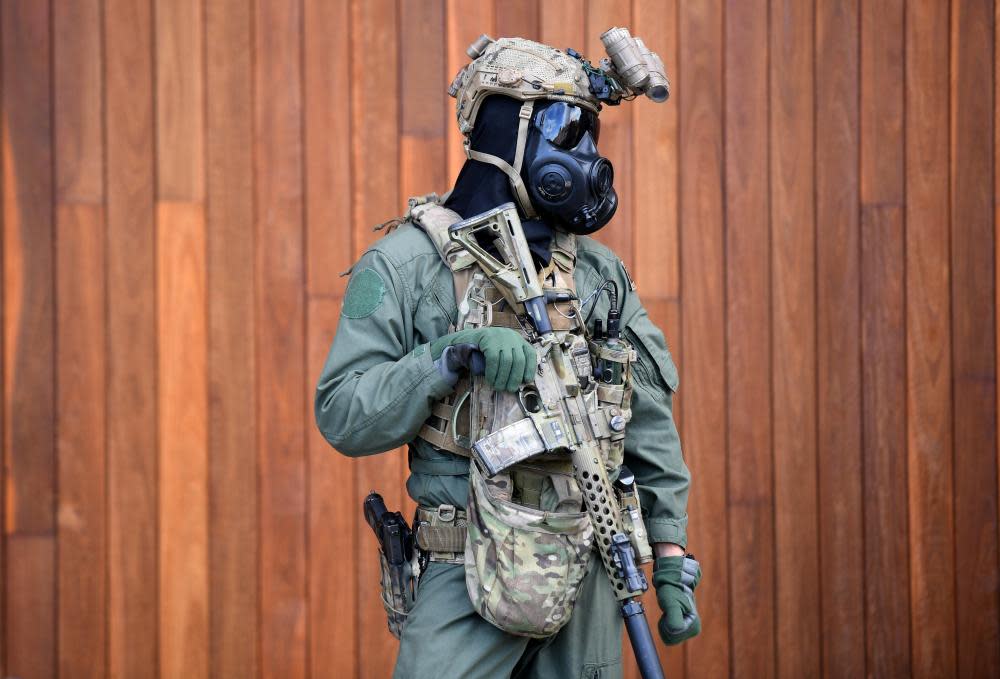Human rights groups want report into 'bone-chilling' claims against SAS released in full

Afghan and Australian human rights groups have urged the government to release an inquiry into “bone-chilling” allegations of special forces war crimes in Afghanistan, saying the public “deserve to know what was done in our name”.
On Friday more than 20 organisations published an open letter to the assistant inspector-general of the Australian Defence Force, Maj Gen Justice Paul Brereton, who is leading the inquiry into the conduct of elite forces in more than 55 incidents of alleged unlawful killings.
Extensive media reporting has painted a damning picture of the actions of some special forces soldiers operating in Afghanistan.
Elite troops have been accused of killing and brutalising unarmed Afghan civilians and prisoners, in some cases slitting their throats, gloating about their actions, and planting weapons on their corpses to justify their actions.
Last week the ABC reported allegations that a bound Afghan detainee was shot after Australian troops were told there was no room for him on a US helicopter.
Related: Australia's special forces problem: why the SAS is facing a crisis
Reports suggest Brereton’s findings will focus on a small group of special forces troops alleged to be largely responsible for alleged war crimes.
The report is being finalised and will be handed to the chief of the Australian defence force who will decide if and how it will be released.
Human rights and legal groups fear the ADF will release only a short summary of the key findings.
Friday’s open letter – signed by the Transitional Justice Coordination Group in Afghanistan, the Afghanistan Human Rights and Democracy Organization, the Australian Centre for International Justice, and the Human Rights Law Centre, among others – said such a situation would be unacceptable for the Australian public.
“Given the strong public interest in the inquiry, the public release of the report will demonstrate that Australia is adhering to its international obligations and is taking appropriate action to prevent future violations of [international humanitarian law],” the letter said.
“The publication of the report of the inquiry will provide an important form of truth and accountability to the defence force and the Australian people about the conduct of its forces in Afghanistan.
“It will also represent a first step towards the accountability sought by Afghan victims and their families.”
Australian Centre for International Justice director Rawan Arraf said a summary was simply not enough.
“The Australian people deserve to know what was done in our name, and to be engaged in a process of ensuring those responsible are held to account,” he said.
“Transparency and accountability are critical to ensure public trust in the independence of the inquiry, the defence force and the process that will follow. Refusal to release the report in full undermines this trust.”
The open letter acknowledges that parts of the report may need to be redacted to protect any future legal proceedings from prejudice.
But Human Rights Law Centre legal director Ruth Barson said the government should commit to releasing those elements once any legal proceedings are concluded. A failure to release the report would hide “the gravest of crimes” committed on behalf of Australia.
“Opaqueness, selectivity and silence in the face of these horrific allegations should not be an option,” she said. “There can be no truth and justice without transparency and accountability.”
The inquiry was established in 2016 to examine the actions of Australian troops between 2005 and 2016 after a direction from the chief of the defence force and is now in its final stages.
The human rights groups said they were aware there would probably be referrals to the Australian federal police for war crimes investigations.
“These allegations, some of which have been made public through extensive media reports, if proven, represent serious and grave violations of [international humanitarian law] which amount to the commission of war crimes,” the letter said.
“The impact on the families and communities affected has been great, and the demands for truth, justice and accountability from the families of the victims cannot be ignored.”

 Yahoo Movies
Yahoo Movies 
